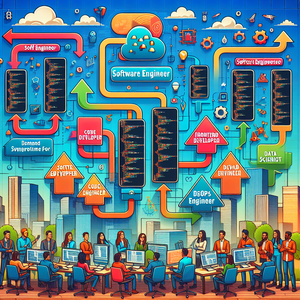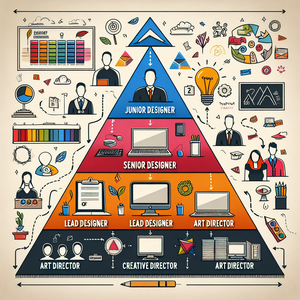
Your Essential Guide to Software Engineering Job Titles: Navigating Roles, Responsibilities, and Career Pathways
The world of software engineering is constantly evolving, presenting a complex web of job titles and roles that can be overwhelming to navigate. This guide is crafted to simplify these roles, outlining their responsibilities, required qualifications, and providing a clear view of career trajectories, industry trends, and salary expectations.
Job Summaries:
Junior Software Engineer:
- Engaging in coding, debugging, and testing under guidance while learning from experienced team members.
- Requires a bachelor’s degree in computer science or a related discipline.
- Requires basic programming skills in languages like Python or Java.
- Serves as a foundational position leading to more advanced roles.
Software Engineer:
- Designing, developing, and maintaining software applications that meet user requirements.
- Generally requires a degree in computer science and proficiency with programming languages and development tools.
- Key role that lays the groundwork for senior positions.
Senior Software Engineer:
- Leading project teams
- Mentoring junior engineers
- Making significant architectural decisions
- Requires several years of experience
- Strong communication skills
- Comprehensive understanding of programming languages
- A stepping stone to higher roles like Staff Engineer or Engineering Manager
Staff Engineer:
- Overseeing complex projects and providing technical guidance
- Acting as a liaison between engineering and management
- Significant experience in software engineering principles and project management is essential
- Can progress to Principal Engineer or higher managerial roles
Principal Engineer:
- Shaping technical strategy
- Leading discussions on architecture
- Mentoring engineering staff
- Extensive experience in software development
- Strong leadership abilities
- A high-level technical role that significantly influences the direction of engineering teams.
Software Architect:
- Crafting the overarching structure of software systems and making pivotal technology decisions.
- A deep understanding of software engineering principles and relevant technologies is required.
- Collaborative position working closely with senior leadership.
Engineering Manager:
- Supervising engineering teams to ensure project delivery aligns with business goals.
- Requires a blend of technical knowledge and leadership experience.
- A managerial role that can lead to executive-level positions in tech.
DevOps Engineer:
- Enhancing collaboration between development and operations, with an emphasis on process automation.
- Strong grasp of development and operational processes, along with skills in automation tools.
- An essential position in modern software development, often leading to senior DevOps or cloud engineering roles.
Quality Assurance Engineer:
- Ensuring software quality through rigorous testing and bug identification.
- Typically requires a degree in a related field and familiarity with testing methodologies.
- Can advance to senior QA roles or transition to development positions.
Technical Lead:
- Directing the technical course of projects while ensuring adherence to best practices.
- Strong technical skills and substantial software development experience are crucial.
- Often serves as a pathway to upper management or architect roles.
Data Engineer:
- Designing data pipelines and architectures for analysis and machine learning.
- A solid background in data modeling and database management is essential.
- An expanding field with potential for roles in data science or analytics leadership.
User Experience (UX) Engineer:
- Crafting user-friendly interfaces and enhancing overall user experience.
- A background in design or human-computer interaction (HCI) coupled with technical front-end development skills.
- Can progress to senior UX roles or product management positions.
Cloud Engineer:
- Designing and implementing cloud-based solutions for software applications.
- Expertise in cloud architecture and services is crucial.
- A critical role as organizations shift to cloud environments, leading to senior cloud architect positions.
Embedded Software Engineer:
- Developing software for embedded systems in various devices.
- A degree in computer engineering and experience with low-level programming.
- Can lead to advanced engineering positions focused on hardware-software integration.
Mobile App Developer:
- Building applications for mobile platforms, emphasizing coding and testing.
- Familiarity with mobile programming languages and design principles is needed.
- A vital role in the tech ecosystem, with pathways to senior mobile architect positions.
Cybersecurity Engineer:
- Establishing security protocols to safeguard software applications from threats.
- In-depth knowledge of security principles and relevant certifications are necessary.
- A pivotal role in data protection, often leading to security leadership positions.
Game Developer:
- Creating interactive games through programming and design.
- A degree in computer science or game design and proficiency with game development tools.
- A specialized area with opportunities for advancement to senior game design roles.
Blockchain Developer:
- Specializing in blockchain technology for cryptocurrencies and decentralized applications.
- Strong programming skills and a solid understanding of blockchain protocols are crucial.
- A rapidly growing field with extensive potential across various industries.
Machine Learning Engineer:
- Developing algorithms for machine learning applications.
- Expertise in programming, statistics, and machine learning frameworks is necessary.
- A significant role in AI development, leading to senior data science or AI engineering positions.
Technical Support Engineer:
- Assisting customers with software-related technical issues.
- Strong troubleshooting skills and a background in IT support are required.
- Can transition into development or QA roles based on experience.
Grasping the diverse roles within software engineering is vital for both newcomers and seasoned professionals. By understanding the responsibilities, qualifications, and potential career paths linked to each title, individuals can strategically navigate their career journeys. This guide not only sheds light on the complexity of software engineering job titles but also underscores the importance of staying informed about industry dynamics and expectations to thrive in this fast-paced field.
Explore More Jobs

